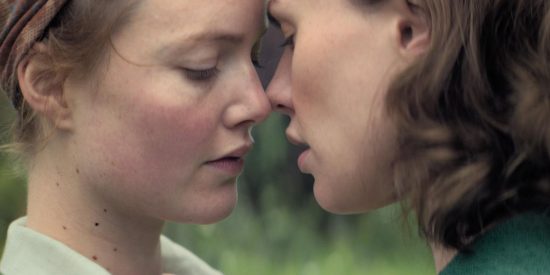TIFF Review: Tell it to the Bees
A lot has changed in this world since the 1950’s, though this film may make you question that. Whispers and rumours still flourish in many a community, their victims often ridiculed or exiled. We live now in a society which values anonymity and privacy despite all of the many avenues we have for communication. But many decades ago words passing from one to another at the local pub, or shop spread information almost as fast and with often deleterious consequences.
Tell it to the Bees is one such story of how outside influences of prejudice and intolerance can hurt and harm. It’s also a coming of age story – not just of its young star, but also of the women who care for him. The film follows the story of Lydia (Holliday Grainger), a factory worker in a small Scottish town. Her husband, Robert (Emun Elliott) has abandoned her and her young son Charlie (Gregor Selkirk) and she has a tough time making ends meet. When she loses her factory job, she becomes the live-in housekeeper for a doctor, Jean Markham (Anna Paquin), who has just returned to town to take over her late father’s practice. As the two of them try to navigate the town’s already unfavourable opinion of them, they find solace and comfort in one another, all while Charlie, noticing his mother’s increasing happiness, tells all his secrets and observations to the bees.
Told entirely from Charlie’s point of view, Tell it to the Bees touches on themes not just of sexuality as the relationship between Lydia and Jean develops, but also racism and community and the consequences of diverging from the “acceptable norm”. It’s a lot to pack into just 90 minutes, and some elements are better developed than others. While touchingly acted by Grainger, Paquin and, especially, young, Selkirk, the dramatic climax in the third act doesn’t seem to hit quite as hard as it could have for emotional impact. To get the most out of this film, you also must suspend disbelief (the bees do take centre stage in an important moment) which for some will be a formidable obstacle in a story that has otherwise been quite grounded. Fans of the Fiona Shaw novel may also be disheartened to know the ending has been altered for their two protagonists, something that always proves controversial with a beloved story.
Overall, director Annabel Jankel, manages to bring this love story to life in a reliable and relatable way, and this team of strong women artists deserves to have their important message told. A few stumbling blocks not withstanding, the final result is still something fans of period drama will enjoy, and something that should stimulate conversation in ourselves about tolerance and the roles we play in sustaining it.












In depth review; If somebody asks me to write a review, i will send this page to him/her as my opinion.